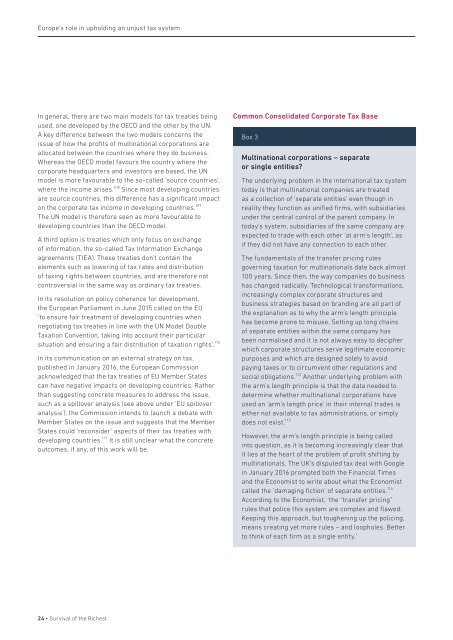Create successful ePaper yourself
Turn your PDF publications into a flip-book with our unique Google optimized e-Paper software.
Europe's role in upholding an unjust tax system<br />
In general, <strong>the</strong>re are two main models for tax treaties being<br />
used, one developed by <strong>the</strong> OECD and <strong>the</strong> o<strong>the</strong>r by <strong>the</strong> UN.<br />
A key difference between <strong>the</strong> two models concerns <strong>the</strong><br />
issue <strong>of</strong> how <strong>the</strong> pr<strong>of</strong>its <strong>of</strong> multinational corporations are<br />
allocated between <strong>the</strong> countries where <strong>the</strong>y do business.<br />
Whereas <strong>the</strong> OECD model favours <strong>the</strong> country where <strong>the</strong><br />
corporate headquarters and investors are based, <strong>the</strong> UN<br />
model is more favourable to <strong>the</strong> so-called ‘source countries’,<br />
where <strong>the</strong> income arises. 108 Since most developing countries<br />
are source countries, this difference has a significant impact<br />
on <strong>the</strong> corporate tax income in developing countries. 109<br />
The UN model is <strong>the</strong>refore seen as more favourable to<br />
developing countries than <strong>the</strong> OECD model.<br />
A third option is treaties which only focus on exchange<br />
<strong>of</strong> information, <strong>the</strong> so-called Tax Information Exchange<br />
agreements (TIEA). These treaties don’t contain <strong>the</strong><br />
elements such as lowering <strong>of</strong> tax rates and distribution<br />
<strong>of</strong> taxing rights between countries, and are <strong>the</strong>refore not<br />
controversial in <strong>the</strong> same way as ordinary tax treaties.<br />
In its resolution on policy coherence for development,<br />
<strong>the</strong> European Parliament in June 2015 called on <strong>the</strong> EU<br />
‘to ensure fair treatment <strong>of</strong> developing countries when<br />
negotiating tax treaties in line with <strong>the</strong> UN Model Double<br />
Taxation Convention, taking into account <strong>the</strong>ir particular<br />
situation and ensuring a fair distribution <strong>of</strong> taxation rights’. 110<br />
In its communication on an external strategy on tax,<br />
published in January 2016, <strong>the</strong> European Commission<br />
acknowledged that <strong>the</strong> tax treaties <strong>of</strong> EU Member States<br />
can have negative impacts on developing countries. Ra<strong>the</strong>r<br />
than suggesting concrete measures to address <strong>the</strong> issue,<br />
such as a spillover analysis (see above under ‘EU spillover<br />
analysis’), <strong>the</strong> Commission intends to launch a debate with<br />
Member States on <strong>the</strong> issue and suggests that <strong>the</strong> Member<br />
States could ‘reconsider’ aspects <strong>of</strong> <strong>the</strong>ir tax treaties with<br />
developing countries. 111 It is still unclear what <strong>the</strong> concrete<br />
outcomes, if any, <strong>of</strong> this work will be.<br />
Common Consolidated Corporate Tax Base<br />
Box 3<br />
Multinational corporations – separate<br />
or single entities?<br />
The underlying problem in <strong>the</strong> international tax system<br />
today is that multinational companies are treated<br />
as a collection <strong>of</strong> ‘separate entities’ even though in<br />
reality <strong>the</strong>y function as unified firms, with subsidiaries<br />
under <strong>the</strong> central control <strong>of</strong> <strong>the</strong> parent company. In<br />
today’s system, subsidiaries <strong>of</strong> <strong>the</strong> same company are<br />
expected to trade with each o<strong>the</strong>r ‘at arm’s length’, as<br />
if <strong>the</strong>y did not have any connection to each o<strong>the</strong>r.<br />
The fundamentals <strong>of</strong> <strong>the</strong> transfer pricing rules<br />
governing taxation for multinationals date back almost<br />
100 years. Since <strong>the</strong>n, <strong>the</strong> way companies do business<br />
has changed radically. Technological transformations,<br />
increasingly complex corporate structures and<br />
business strategies based on branding are all part <strong>of</strong><br />
<strong>the</strong> explanation as to why <strong>the</strong> arm’s length principle<br />
has become prone to misuse. Setting up long chains<br />
<strong>of</strong> separate entities within <strong>the</strong> same company has<br />
been normalised and it is not always easy to decipher<br />
which corporate structures serve legitimate economic<br />
purposes and which are designed solely to avoid<br />
paying taxes or to circumvent o<strong>the</strong>r regulations and<br />
social obligations. 112 Ano<strong>the</strong>r underlying problem with<br />
<strong>the</strong> arm’s length principle is that <strong>the</strong> data needed to<br />
determine whe<strong>the</strong>r multinational corporations have<br />
used an ‘arm’s length price’ in <strong>the</strong>ir internal trades is<br />
ei<strong>the</strong>r not available to tax administrations, or simply<br />
does not exist. 113<br />
However, <strong>the</strong> arm’s length principle is being called<br />
into question, as it is becoming increasingly clear that<br />
it lies at <strong>the</strong> heart <strong>of</strong> <strong>the</strong> problem <strong>of</strong> pr<strong>of</strong>it shifting by<br />
multinationals. The UK’s disputed tax deal with Google<br />
in January 2016 prompted both <strong>the</strong> Financial Times<br />
and <strong>the</strong> Economist to write about what <strong>the</strong> Economist<br />
called <strong>the</strong> ‘damaging fiction’ <strong>of</strong> separate entities. 114<br />
According to <strong>the</strong> Economist, ‘<strong>the</strong> “transfer pricing”<br />
rules that police this system are complex and flawed.<br />
Keeping this approach, but toughening up <strong>the</strong> policing,<br />
means creating yet more rules – and loopholes. Better<br />
to think <strong>of</strong> each firm as a single entity.’<br />
24 • <strong>Survival</strong> <strong>of</strong> <strong>the</strong> <strong>Richest</strong>


